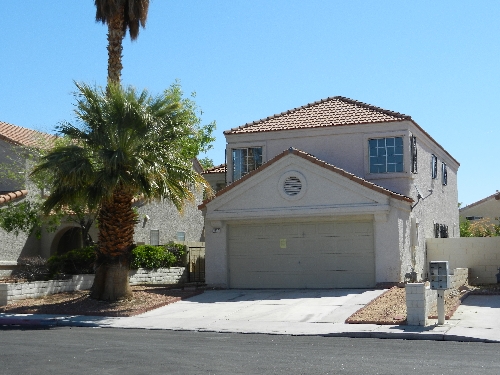Council approves process to speed up abatements for eyesore homes

You’ve probably seen them — abandoned houses dotting neighborhoods across the valley.
They can become a source of blight and bring down property values even more. The only recourse for those living nearby is to complain to the city about the conditions — anything from green water swimming pools, to weeds to trash — and wait until the city sends cleanup crews.
It used to be months before the city of Las Vegas acted on eyesore complaints and put the house into "abatement" status, where fees are imposed for any cleanup.
At a Las Vegas City Council meeting earlier this year, Ward 2 Councilman Steve Wolfson proposed a change in how such complaints are handled, cutting the red tape and resulting in a faster turnaround.
"You’ll have a beautiful home in The Lakes or somewhere, but if someone loses their job and can’t afford their house, they’ll just let it go," Wolfson said. "Sometimes they’ll just literally walk away from it."
The change is now in place. It used to take six months or more from the time a case was generated until the time items were brought before the council. The city’s goal is to now have a 90-day turnaround, ensuring cleanup crews are dispatched in a timely manner.
The primary change is the timeline for processing abatements.
The property at 3332 Mariner Bay, like a few more in the area, is one of the abatement properties. It has been vacant for months, neighbors said. Weeds were ordered removed, putting the home into the abatement process. The city cleaned it up. The property now has more than $5,000 in assessed penalties.
Coralissa Delaforce, who rents a house nearby, said it didn’t bother her and there was a worse-looking one up the street.
"In this (economic) time, I get it," she said. "People haven’t got a lot of money. Vegas got hit hard."
The impact on the community that’s most evident is the quicker action on nuisance properties. Plus, the city now sees a decrease in staff hours for each case.
The benefit to the owner of the property that is not in compliance is the daily civil penalties and inspection fees assessed for noncompliance will be lower because there is less time between the abatement and the action by the council.
Since many of the homes in abatement are now bank-owned, lien costs often include added fees for non-payment.
By dealing with the abatement homes this new way, the city can order cleanup services sooner so neighbors do not have to live with an eyesore next door for months on end.
Ward 4 City Councilman and Mayor Pro Tem Stavros Anthony said that before the change, the council heard complaints "on a regular basis" from buyers who were unaware of the city’s liens. He said the new system attaches the information to the property almost immediately after civil penalties are assessed.
"Now, five years ago, the issue probably never came up," he said, referring to the rosy housing picture before the bubble burst. "You should be able to look up a property and immediately see if there’s a lien on it."
Last year’s U.S. Census figures show that of the estimated 130 million housing units in the United States, 11.3 percent — about 14 million — stood vacant.
Contact Summerlin/Summerlin South View reporter Jan Hogan at jhogan@viewnews.com or 387-2949.